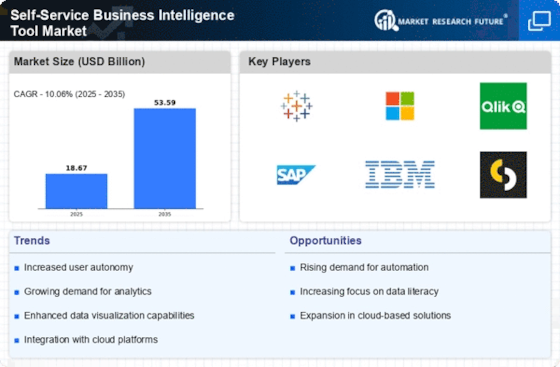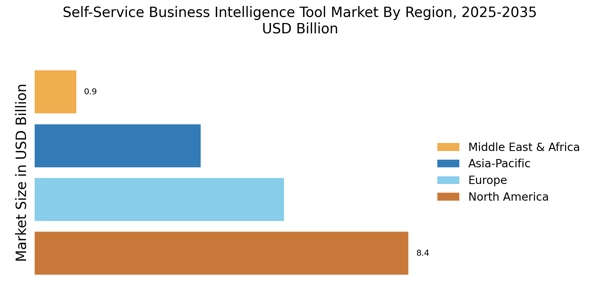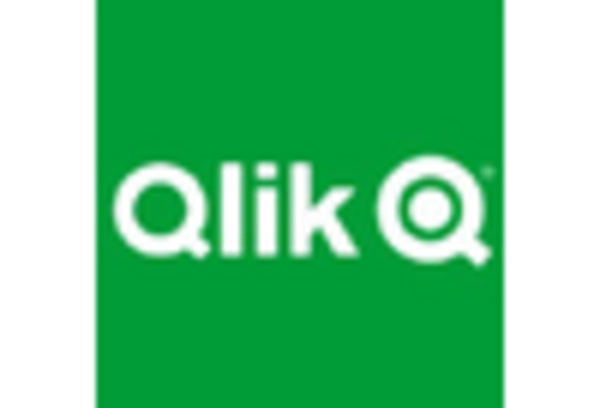Rise of Cloud-Based Solutions
The Self-Service Business Intelligence Tool Market is witnessing a notable shift towards cloud-based solutions. Organizations are increasingly adopting cloud technologies to facilitate easier access to data and analytics tools. The flexibility and scalability offered by cloud-based self-service BI tools are appealing to businesses of all sizes. Recent data suggests that the cloud segment of the self-service BI market is expected to account for over 60% of total market revenue by 2026. This transition allows organizations to reduce infrastructure costs while enhancing collaboration among teams. Furthermore, cloud-based solutions enable real-time data sharing and analysis, which is crucial for timely decision making. As a result, the demand for self-service BI tools that leverage cloud technology is likely to continue to rise.
Focus on Enhanced User Experience
The Self-Service Business Intelligence Tool Market is placing a strong emphasis on enhancing user experience. As organizations adopt self-service BI tools, the usability and intuitiveness of these platforms become critical factors for success. Companies are increasingly prioritizing user-friendly interfaces and streamlined workflows to ensure that employees can easily navigate and utilize the tools. Recent market analysis suggests that self-service BI tools with superior user experience are likely to capture a larger market share, as they facilitate quicker adoption and greater user satisfaction. This focus on user experience is indicative of a broader trend towards democratizing data access, enabling users from various departments to engage with analytics without extensive training. As a result, the self-service BI market is expected to evolve, with a continued emphasis on creating tools that are not only powerful but also accessible.
Growing Emphasis on Data Literacy
The Self-Service Business Intelligence Tool Market is increasingly influenced by the growing emphasis on data literacy across organizations. As businesses recognize the importance of equipping employees with the skills to interpret and utilize data effectively, the demand for self-service BI tools is expected to rise. Reports indicate that organizations with higher data literacy levels are more likely to achieve better business outcomes. Consequently, self-service BI tools are being designed to cater to users with varying levels of data expertise, making analytics more accessible. This trend suggests that organizations are prioritizing investments in self-service BI solutions to foster a data-driven culture. By enhancing data literacy, companies can empower their workforce to leverage insights for improved decision making, thereby driving growth in the self-service BI market.
Increased Demand for Data-Driven Decision Making
The Self-Service Business Intelligence Tool Market is experiencing a surge in demand as organizations increasingly recognize the value of data-driven decision making. Companies are striving to enhance operational efficiency and improve strategic planning through data insights. According to recent estimates, the market for self-service BI tools is projected to grow at a compound annual growth rate of approximately 20% over the next five years. This growth is fueled by the need for businesses to remain competitive in a data-centric environment. As more employees seek to access and analyze data independently, the self-service BI tools are becoming essential for fostering a culture of analytics within organizations. This trend indicates a shift towards empowering users at all levels to make informed decisions based on real-time data.
Integration with Artificial Intelligence and Machine Learning
The Self-Service Business Intelligence Tool Market is increasingly integrating artificial intelligence (AI) and machine learning (ML) capabilities. This integration enhances the functionality of self-service BI tools, allowing users to derive deeper insights from their data. AI and ML algorithms can automate data analysis, identify patterns, and provide predictive analytics, which significantly improves decision-making processes. Recent studies indicate that organizations utilizing AI-driven self-service BI tools experience a 30% increase in operational efficiency. As businesses seek to harness the power of advanced analytics, the demand for self-service BI tools that incorporate AI and ML is likely to grow. This trend not only streamlines data analysis but also empowers users to make informed decisions based on sophisticated insights.

















